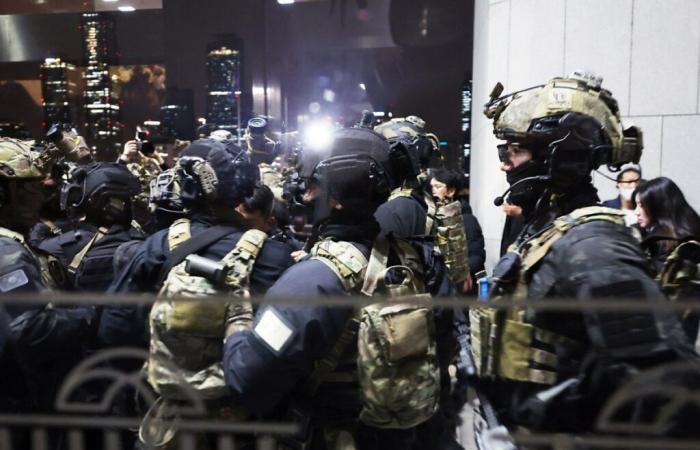Keystone-SDA
South Korean President Yoon Suk Yeol proclaimed martial law on Tuesday, a decision immediately contested by a vote in the National Assembly, where the opposition is in the majority and in front of which demonstrators gathered at his call.
This content was published on
December 3, 2024 – 7:07 p.m.
(Keystone-ATS) The army, however, warned that it would enforce martial law until it was lifted by the president.
“To protect liberal South Korea from the threats posed by North Korean communist forces and eliminate elements hostile to the state (…), I declare martial law,” the president declared live in a surprise televised address.
Martial law has not been imposed in South Korea since the democratization process began in the late 1980s.
“Without caring about the livelihoods of the people, the opposition party paralyzed the government (…) to protect its leader from legal proceedings,” accused the president.
All political activities have been banned and media are placed under government surveillance, Army Chief Park An-su said in a statement. Helicopters landed on the roof of the parliament building in Seoul, according to live footage broadcast by television channels.
South Korean opposition leader Lee Jae-myung called martial law “illegal” and called on people to gather outside parliament in protest.
“President Yoon Suk Yeol’s illegal imposition of martial law is invalid,” said Mr Lee, who narrowly lost to Yoon in the 2022 election. “Come to the National Assembly now. I’m going there too,” he added.
“Open the door!” »
Hundreds of people heeded his call, flocking to Parliament from 1 a.m. (5 p.m. Swiss), chanting “Stop Yoon Suk Yeol”.
“At first I thought it was bogus information, I couldn’t believe in martial law. Afterwards, I decided to come here to protect democracy, not only for us but also for our children,” Lee Jin-hwa, 48, told AFP in the crowd.
Some 190 deputies managed to enter the Assembly, after being briefly prevented by soldiers who eventually left the premises. They voted unanimously in favor of a motion blocking the application of martial law and calling for its lifting.
“Of the 190 deputies present, 190 spoke in favor of the resolution calling for the lifting of martial law, which is therefore adopted,” said National Assembly Speaker Woo Won-shik.
“The army will enforce martial law until it is lifted by the president,” the general staff immediately reacted according to local media.
The United States and the United Kingdom expressed their concern, while China called on its fellow citizens in South Korea to be “cautious”.
“We are observing recent developments with great concern” in South Korea, said Kurt Campbell, deputy US secretary of state. “We hope and expect that political disputes will be resolved peacefully and with respect for the rule of law.”
Mr. Yoon’s People Power Party continues to battle with the main opposition Democratic Party over next year’s proposed budget.
“Criminal refuge”
Opposition MPs approved a significantly reduced budget program last week through a committee.
“Our National Assembly has become a refuge for criminals, a den of legislative dictatorship that seeks to paralyze the administrative and judicial systems and overthrow our liberal democratic order,” Mr. Yoon said to justify the establishment of martial law.
He accused the elected representatives of the opposition of cutting “all budgets essential to the primary functions of the nation which are the fight against drug-related crimes and the maintenance of public security (…) transforming the country into a paradise of drugs and in a place of chaos for public safety.”
Mr. Yoon went on to characterize the opposition, which holds a majority in Parliament, as “forces hostile to the state intending to overthrow the regime.”
“I will restore normalcy in the country by getting rid of these forces hostile to the state as soon as possible,” added the South Korean president, whose rating was plummeting in the polls.
Martial law had not been imposed in South Korea since the democratization process that began in the late 1980s, including periods of high tension, such as in 2016, when millions of demonstrators obtained the dismissal of the President Park Geun-Hye, amid a corruption scandal. It was last decreed on May 17, 1980, during the military coup of General Chun Doo-hwan.
The next day, hundreds of thousands of people took to the streets of Gwangju (South-West), a traditional center of protest, to protest against the coup. Mr. Chun wanted to fill the power vacuum after the assassination of dictator Park Chung-hee. The demonstrations were repressed in a bloodbath. Martial law was lifted in January 1981.






